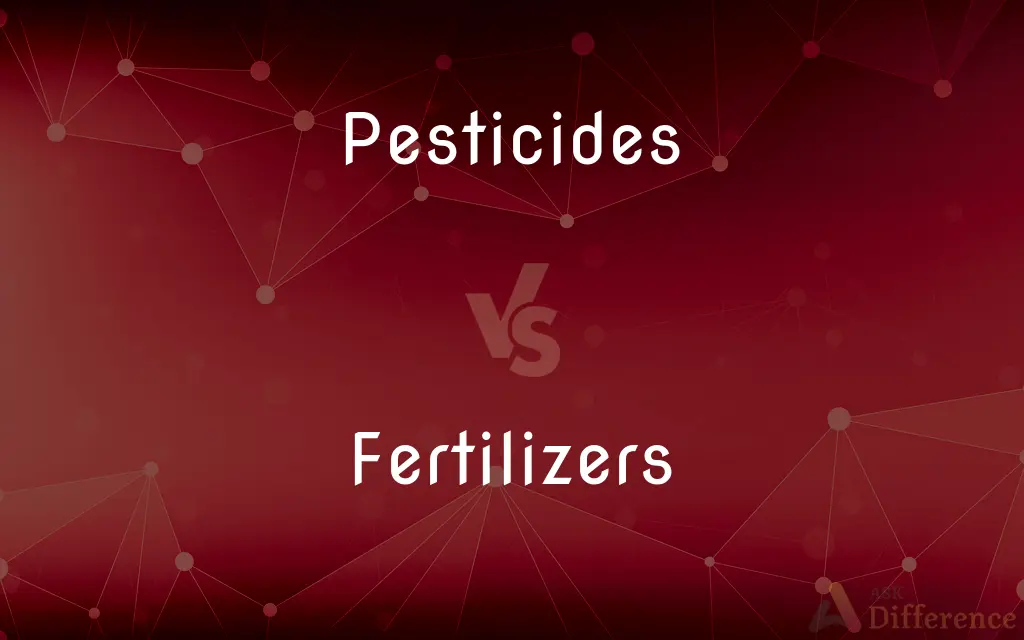Pesticides vs. Fertilizers — What's the Difference?
Edited by Tayyaba Rehman — By Fiza Rafique — Published on December 31, 2023
Pesticides control pests and diseases, while fertilizers provide plants with essential nutrients. Using both pesticides and fertilizers judiciously is vital for sustainable agriculture.

Difference Between Pesticides and Fertilizers
Table of Contents
ADVERTISEMENT
Key Differences
Pesticides are chemicals or biological agents designed to manage, repel, or destroy pests that can harm plants. On the contrary, fertilizers are substances added to soil to supply plants with the necessary nutrients for growth.
While the primary aim of pesticides is to safeguard plants from harmful organisms or weeds, fertilizers focus on enriching the soil to boost plant health. Pesticides often target insects, fungi, rodents, or weeds, whereas fertilizers usually contain a mix of essential nutrients like nitrogen, phosphorus, and potassium.
Using both pesticides and fertilizers judiciously is vital for sustainable agriculture. Overuse of pesticides can lead to resistant pests and environmental harm, while excessive fertilizers can pollute waterways and degrade soil quality.
Comparison Chart
Primary Purpose
Control pests and diseases
Provide nutrients to plants
Composition
Chemical or biological agents
Nutrient compounds (e.g., N-P-K)
ADVERTISEMENT
Effect on Environment
Can be toxic if misused; potential bioaccumulation
Can cause eutrophication if overused
Usage
Applied when pests or diseases are present
Used regularly for plant growth
Potential Risks
Resistant pests, harm to non-target species
Soil degradation, water pollution
Compare with Definitions
Pesticides
Pesticides protect plants from harmful organisms.
With the help of pesticides, the garden remains free from damaging bugs.
Fertilizers
Fertilizers enrich soil with essential nutrients.
To boost plant growth, she added fertilizers to her garden.
Pesticides
Pesticides can be chemical or biological in nature.
Some organic farms opt for biological pesticides over chemical ones.
Fertilizers
Fertilizers aid in enhancing plant health and yield.
With the right fertilizers, the farmer doubled his crop yield.
Pesticides
Pesticides can target a variety of pests, including insects and fungi.
Different pesticides are available for different pests.
Fertilizers
Fertilizers can be organic or inorganic.
She prefers organic fertilizers for her vegetable garden.
Pesticides
Pesticides are agents used to deter pests.
Farmers use pesticides to keep harmful insects away from crops.
Fertilizers
Fertilizers contain elements like nitrogen, phosphorus, and potassium.
The N-P-K ratio on fertilizers indicates nutrient composition.
Pesticides
Pesticides should be used judiciously to avoid environmental harm.
It's crucial to read the label before applying pesticides to plants.
Fertilizers
Fertilizers should be applied based on soil needs.
Before using fertilizers, it's a good idea to test the soil's nutrient levels.
Pesticides
A substance or agent used to kill pests, such as unwanted or harmful insects, rodents, or weeds.
Fertilizers
Any of a large number of natural and synthetic materials, including manure and nitrogen, phosphorus, and potassium compounds, spread on or worked into soil to increase its capacity to support plant growth.
Pesticides
Plural of pesticide
Fertilizers
Plural of fertilizer
Common Curiosities
Can pesticides harm beneficial insects?
Yes, some pesticides can harm beneficial insects if not used selectively.
Are all fertilizers chemical-based?
No, fertilizers can be organic (from natural sources) or inorganic (chemically synthesized).
Can overuse of pesticides be harmful?
Yes, overusing pesticides can harm the environment, lead to resistant pests, and affect non-target organisms.
What are pesticides primarily used for?
Pesticides are used primarily to control, repel, or destroy pests harmful to plants.
Why are fertilizers important for plants?
Fertilizers provide plants with essential nutrients they need for growth and health.
How often should pesticides be applied?
Pesticides should be applied as needed, following label recommendations and integrated pest management practices.
Can plants grow without fertilizers?
Plants can grow without fertilizers, but they may lack certain nutrients and exhibit stunted growth.
Are there specific fertilizers for different plants?
Yes, there are specific fertilizers tailored for certain plants, like roses or tomatoes.
What is eutrophication linked to fertilizers?
Eutrophication is the excessive nutrient enrichment of water bodies, often due to runoff from overused fertilizers.
Are there natural alternatives to chemical pesticides?
Yes, biological pesticides, like certain fungi or bacteria, are natural alternatives.
Do pesticides have expiration dates?
Yes, pesticides have expiration dates, and their efficacy can decrease after this date.
Can I make my own organic fertilizers?
Yes, compost and worm castings are examples of homemade organic fertilizers.
What's the difference between herbicides and pesticides?
Herbicides are a type of pesticide specifically designed to control or kill unwanted plants (weeds).
Can overuse of fertilizers harm plants?
Yes, overusing fertilizers can "burn" plants due to excessive salts and harm the soil structure.
How should fertilizers be stored?
Fertilizers should be stored in a cool, dry place, away from children and pets.
Share Your Discovery

Previous Comparison
Pixie Frog vs. Pacman Frog
Next Comparison
Linking Verbs vs. Helping VerbsAuthor Spotlight
Written by
Fiza RafiqueFiza Rafique is a skilled content writer at AskDifference.com, where she meticulously refines and enhances written pieces. Drawing from her vast editorial expertise, Fiza ensures clarity, accuracy, and precision in every article. Passionate about language, she continually seeks to elevate the quality of content for readers worldwide.
Edited by
Tayyaba RehmanTayyaba Rehman is a distinguished writer, currently serving as a primary contributor to askdifference.com. As a researcher in semantics and etymology, Tayyaba's passion for the complexity of languages and their distinctions has found a perfect home on the platform. Tayyaba delves into the intricacies of language, distinguishing between commonly confused words and phrases, thereby providing clarity for readers worldwide.
















































